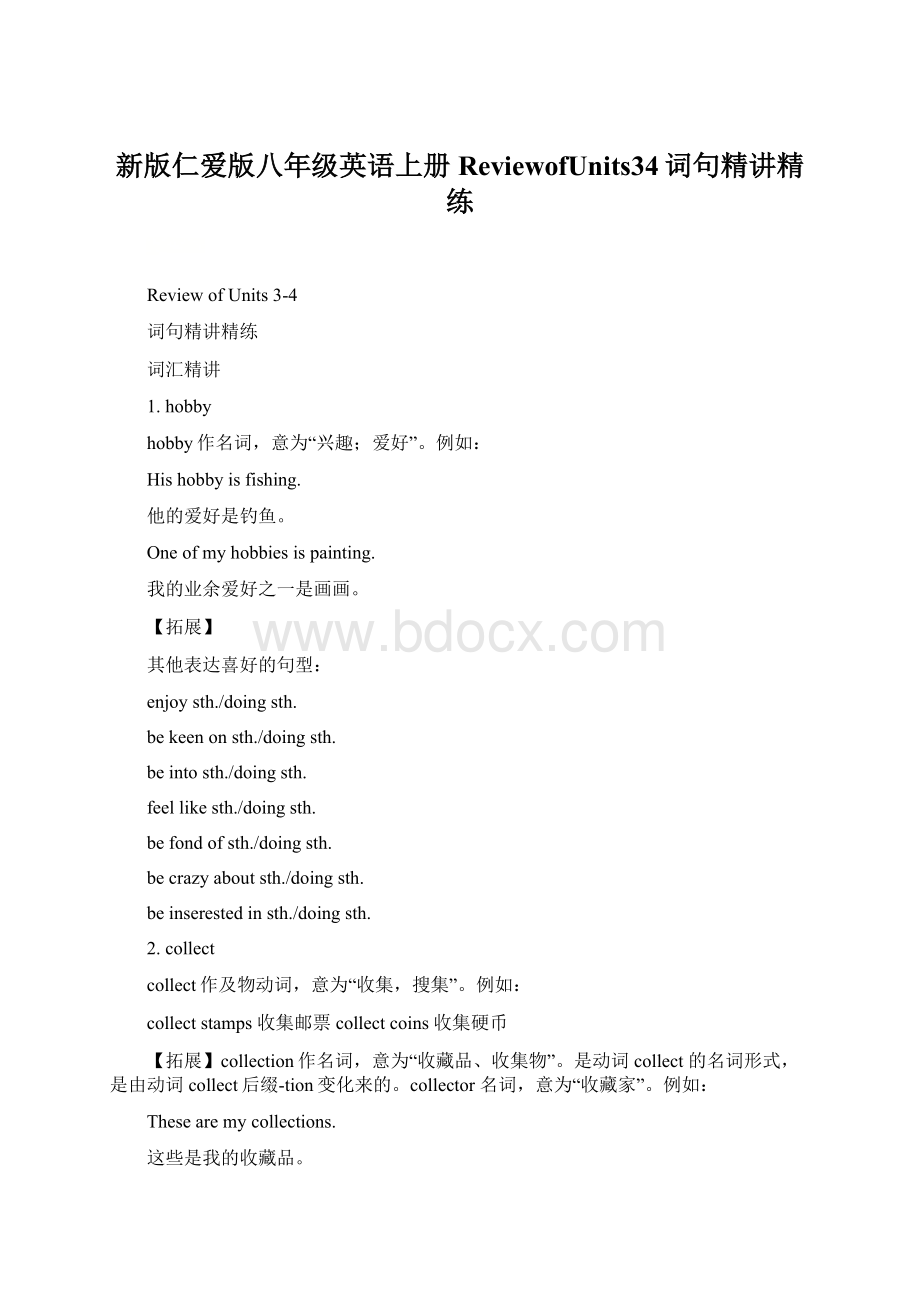新版仁爱版八年级英语上册ReviewofUnits34词句精讲精练.docx
《新版仁爱版八年级英语上册ReviewofUnits34词句精讲精练.docx》由会员分享,可在线阅读,更多相关《新版仁爱版八年级英语上册ReviewofUnits34词句精讲精练.docx(14页珍藏版)》请在冰豆网上搜索。

新版仁爱版八年级英语上册ReviewofUnits34词句精讲精练
ReviewofUnits3-4
词句精讲精练
词汇精讲
1.hobby
hobby作名词,意为“兴趣;爱好”。
例如:
Hishobbyisfishing.
他的爱好是钓鱼。
Oneofmyhobbiesispainting.
我的业余爱好之一是画画。
【拓展】
其他表达喜好的句型:
enjoysth./doingsth.
bekeenonsth./doingsth.
beintosth./doingsth.
feellikesth./doingsth.
befondofsth./doingsth.
becrazyaboutsth./doingsth.
beinserestedinsth./doingsth.
2.collect
collect作及物动词,意为“收集,搜集”。
例如:
collectstamps收集邮票collectcoins收集硬币
【拓展】collection作名词,意为“收藏品、收集物”。
是动词collect的名词形式,是由动词collect后缀-tion变化来的。
collector名词,意为“收藏家”。
例如:
Thesearemycollections.
这些是我的收藏品。
Mybrotherhasaverygoodcollectionofstamps.
我的弟弟收集了许多邮票。
Markisafamousstampcollector.
Mark是一位著名的邮票收藏家。
3.lend
lend作及物动词,意为“借给,借出”,表示“自己”借给“他人”。
常用结构有:
lendsb.sth.或lendsth.tosb.借给某人某物。
例如:
Canyoulendmeyourruler?
=Canyoulendyourrulertome?
把你的尺子借给我好吗?
【辨析】
lend
借出,借给
表示把东西借给他人
常用搭配:
lendsb.sth.或lendsth.tosb.
borrow
借入,借来
表示从他人借入
常用搭配:
borrowsth.fromsb.
例如:
SheborrowsanEnglishdictionaryfromherclassmateandlendsapentoherfriend.
她向同学借了一本字典,并把一支钢笔借给了朋友。
4.wonder
wonder作及物动词,意为“想知道;对……感到怀疑”,常见的用法有:
(1)后接who,what,why,where等引导的宾语从句。
例如:
Iwonderwhosheis.我想知道她是谁。
Shewonderedwhatthechildwasdoing.
她感到疑惑,孩子究竟在干什么。
IwonderwhyAnnislate.我想知道安为什么迟到了。
Iwonderwheretheyhavegone.我想知道他们去哪儿了。
(2)后接that引导的宾语从句,表示“对……感到惊讶”,that常可省去。
例如:
Iwonder(that)shehaswontherace.
我对她赢了比赛感到惊讶。
(3)后接if或whether引导的宾语从句,常用来表示一种委婉的请求或疑问。
例如:
Shewonderedwhetheryouwerefreethatmorning.
她想知道你那天上午是否有空。
Iwonderifhewillsucceed.
我不知道他会不会成功。
5.agree
agree作不及物动词,意为“同意”,Iagree意为“同意,赞成”,Idon’tagree表示“不赞成某人或某人的观点”,常用于交际用语中。
另外,agree后接不定式,但不能接动名词。
例如:
Sheagreedtolendmethebook.她同意把那本书借给我。
Iagreetomeethimtomorrow.我同意明天见他。
【拓展】
agreewith和agreeto(to为介词)都表示“同意,赞同”,但后面所接的宾语不同。
agreewith后接指人或表示意见、看法的词;agreeto后接表示建议、计划、安排之类的词。
例如:
Iquiteagreewithyou.我很同意你(的意见)。
DoyouagreewithwhatIhavesaid?
你同意我所说的话吗?
Hehasagreedtooursuggestionabouttheholiday.他已经同意我们度假的建议了。
6.beat
beat作及物动词,有以下用法:
(1)意为“赢;打败;战胜”,后接人或某一团队、组织等,其过去式为beat。
例如:
Ibeathimatlongjumpyesterday.昨天跳远我赢了他。
(2)意为“打;击”,表示连续不断的打击。
例如:
Whoisbeatingthedrum?
谁在打鼓?
(3)表示“(心脏)等跳动”。
例如:
Ifeelmyheartisbeatingfast.我觉得我的心脏在剧烈跳动。
【拓展】
beat和win都有“赢”的意思,但用法不同:
beat的宾语为人或相当于人的团体、组织;而win的宾语为比赛或某个项目,过去式为won。
例如:
Thoughwewereweak,webeatthem.虽然我们弱,但我们赢了他们。
Whowinthefirstprizeinthecompetition?
谁在比赛中赢得了一等奖?
7.share
(1)share用作及物动词,意为“共用;合用;分享”。
例如:
It’shardtosharepower.权力很难分享。
(2)sharesth.withsb.意为“与某人分享某物”。
例如:
Tonysharedhischocolatewithotherkids.
托尼把他的巧克力与其他孩子分着吃了。
Shesharesahousewithtwootherstudents.
她与另外两个同学合住一所房子。
8.thousand
thousand是数词,意为“千”,当表示具体的“几千”时,用“基数词+thousand”,注意不加-s。
例如:
Thereareninethousandstudentsinourschool.我们学校有9000名学生。
【拓展】
(1)thousandsof表示“数千,成千上万的”,这时thousand后要加-s,且后面有介词of,但是不能与数词连用。
例如:
Therearethousandsofpeopleinthestreet.在街上有成千上万的人。
(2)表示数词的还有hundred“百”,million“百万”,billion“十亿”。
它们的用法和thousand一样,可以用来表示约数和确数。
例如:
Morethannine hundred peoplehavediedinthefighting.
900多人在这场战斗中丧生。
Theprogrammewasviewedontelevisionin millions of homes.
无数家庭通过电视收看了这个节目。
9.findout
findout意为“找到,发现,查明”,多指通过调查、询问、打听、研究之后“弄明白”。
通常含有“经过困难、曲折”之后才找出难以找到的东西。
例如:
Pleasefindoutwhenthetrainleaves.请查一下火车什么时候离站。
【拓展】
(1)find是动词,意为“找到”,通常指找到或发现具体的东西,强调的是找的结果。
例如:
Hedidn’tfindhisbook.他没有找到他的书。
(2)lookfor意为“寻找”,是有目的地找,强调找的动作。
例如:
Jimislookingforhislittledog.吉姆正在找他的狗。
10.protect
protect为及物动词,意为“保护”。
常用搭配protectsb./sth.from…,意为“保护某人/某物免受……伤害”。
例如:
Weshouldprotectrareanimals.
我们应该保护珍稀动物。
Parentsprotecttheiryoungfromdanger.
父母保护他们的儿女不受伤害。
11.lookup
lookup意为“(在词典或参考书中)查阅,检查”,其后跟名词作宾语,名词可放在look和up之间,也可放在lookup之后;如果代词作宾语,则只能放在look和up之间。
例如:
Lookupthewordinthebook,andyouwillknowitsmeaning.
在书中查查这个词,你就知道它的意思了。
Pleaselookthemupinthedictionarycarefully.
请仔细在词典中查一下它们。
12.payattentionto
payattentionto表示“注意;留心;专心”,该短语中to是介词,后面可以接名词、代词、动名词或宾语从句。
例如:
Don’tpayanyattentiontoNina—shedoesn’tknowwhatshe’stalkingabout.
别理睬Nina——她根本不知道自己在说什么。
Youmustpayattentiontotheproblemsofspellinginyourwriting.
你必须注意你写作中的拼写问题。
Youshouldpaymoreattentiontoobserving.
你应该多注意观察。
词汇精练
I.根据首字母提示及汉语意思写单词。
1.Myh_____iscollectingstamps.
2.Afthinghappenedinthesubwayyesterday.
3.Hewaitedforuswithaletterofi.
4.Truefisworthmorethanmoney.
5.I_______(想知道)iftherearesomeseatsstillavailable.
6.Afterabrief________(平静),fightingbrokeoutagain.
7.Hehasrunoutoffood,hischildrenareh__________.
8.It’sourdutyandresponsibilityto(保护)thisland.
9.Thejobwas(完美的);therewasnotasinglemistake.
10.Afterseveralyears’studyhegotalotof(知识).
II.用括号中所给单词适当形式填空(每空不限一词)。
1.Heis______(interested)inart,andmusic,andbooks,andsoon.
2.Theyhavealarge______(collect)offishes.
3.Thelocalpeoplearealwaysvery______(friend)towardstourists.
4.Hehopesthathisreasonsmaybe______(understand).
5.Tom,letme______(introduction)myfriendtoyou.
6.Everythingisverygreenand______(peace).
7.Theysaidtheshipwas________(miss).
8.Theforeignvisitorsaregoingtotravelinsome________(south)provincesofChina.
9.Sheaskedthepolice________(search)formissingsoldiers.
10.TheChineseversionoftheEnglishnovel________(appear)intheearly1950s.
III.从方框中选择恰当短语并用其适当形式填空。
agreewithsb.,wakeup,befondof,loseoneselfin…,lookup,
lessandless,indanger,dieout,thousandsof,inalowvoice
1.Wetalkedbecausewedidn’twanttowakethebabyup.
2.Thewaterinthelakeisgetting_____________.
3.Thedamwas__________becauseoftherisingflood.
4.Shethebeautyofthisearlyspringmorning.
5.Wecanthewordinthedictionary.
6.peopleranintothestadiumtowatchthefootballmatch.
7.I’mreallyveryswimminginsummer.
8.Iusedtoearlyandgetupat6:
30.
9.Manywhaleswerekilledthatweareafraidthattheymight.
10.Hegetsangrywhenpeopledonothim.
【参考答案】
I.根据首字母提示及汉语意思写单词。
1.hobby2.funny3.introduction4.friendship
5.wonder6.peace7.hungry8.protect
9.perfect10.knowledge
II.用括号中所给单词适当形式填空(每空不限一词)。
1.interested2.collection3.friendly4.understood.5.introduce
6.peaceful7.missing8.southern9.tosearch10.appeared
III.从方框中选择恰当短语并用其适当形式填空。
1.inalowvoice2.lessandless3.indanger
4.lostherselfin5.lookup6.Thousandsof
7.fondof8.wakeup9.dieout
10.agreewith
句式精讲
1.MaybeIneedachange.
maybe作副词,主要用于非正式场合,口语中常用,意为“也许,大概”。
它通常放在句子的开头,在句子中作状语。
例如:
Maybetheywon’tcomeheretonight.他们大概今晚不会来这儿。
Maybesheishappy.也许她是幸福的。
【拓展】
maybe是“情态动词may+动词原形be”构成的,在句中做谓语,意为“可能是、大概是”。
例如:
Shemaybeathome.她可能在家。
(也可以说:
Maybesheisathome.)
Youmayberight.你可能是对的。
(也可以说:
Maybeyouareright.)
2.Iusedtocollectbaseballcards.
usedtodosth.是一个固定结构,意思是“过去经常做某事”,后面用动词原形,表示过去的某种经常性、习惯性的行为或者动作,并意味着这种动作目前已经不存在。
肯定句:
Iusedtoplaywithmyfriendsafterschool.
过去放学后我常常和朋友们一起玩。
否定句:
Youdidn’tusetolikepopsongs.=Youusedn’ttolikepopsongs.
你过去不喜欢流行歌曲。
一般疑问句:
Didyoursisterusetobequiet?
=Usedyoursistertobequiet?
你的妹妹过去常常是很安静吗?
therebe句式:
Thereusedtobealotoffishesinthisriver.
过去这条小河常常有许多鱼。
【拓展】
(1)beusedtodosomething意思是“被用来做某事”,是动词短语use…todo的被动语态结构。
例如:
Knivesareusedtocutthings.小刀是用来切东西的。
(2)beusedtodoingsomething意思是“习惯于做某事”,to后接动词-ing形式。
例如:
Myfatherisusedtolivinginthevillage.我爸爸习惯于住在村子里。
3.Butthegirlwasafraidtogohomewithoutsellingoneboxofmatches.
(1)beafraid之后可接不定式,也可接名词、代词或ofdoingsth.表示“害怕做某事”或“不敢做某事”。
例如:
Shewasafraidtotellyou.她害怕告诉你。
Sheisafraidofgoingoutalonelateatnight.她很怕深夜独自外出。
I’mafraidofthedog.我怕狗。
(2)但若要表示担心可能会发生某事,则只能用beafraidofdoing而不能用beafraidtodo。
例如:
I’mafraidofbeinglateforclass.我担心上课迟到。
【拓展】
beafraid后可接that从句,表示“担心……”。
例如:
Heisafraidthathisfatherwillbeunhappy.
他担心他的爸爸会不高兴。
4.AndthentheyfelttootiredtoworkonMondaymornings.
too…to…意为“太……而不能”。
它在结构形式上是肯定的,但意义上却表示否定含义,所以动词不定式符号to前不能再加not,只接动词原形即可,too后接形容词或副词原形。
例如:
Thebookistoodifficulttounderstand.这本书难于理解。
【拓展】
(1)在too…to…句型中,当动词不定式的动词是不及物动词,其后所跟的介词不能省略。
例如:
Theroomistoosmalltolivein.这房间太小了不能住。
(2)在too…to…句型中,当动词不定式的宾语实际上就是这个句子的主语时,动词不定式后面不能再加代词作宾语。
例如:
Thequestionistoodifficulttoanswer.这个问题太难了,无法回答。
(3)在too…to…句型中,当动词不定式能确切说明动作执行者时,可以在动词不定式前面加上逻辑主语,即forsb.形式。
例如:
Theboxistooheavyforhimtocarry.箱子太沉了,他搬不动。
(4)含too…to…的句子可以改写成so…that…句型,意为“如此……以至于……”。
例如:
Heistoooldtodohardwork.=
Heissooldthathecan’tdohardwork.他年纪太大而不能干重活。
(5)含too…to…的句子也可以用“not+形容词/副词+enoughtodosth.”句型来替换,但注意要用原句中形容词或副词的反义词。
例如:
Heistoooldtodohardwork.=
Heisnotyoungenoughtodohardwork.他年纪大了,不能做重活。
5.Whatareyouthinkingabout?
(1)thinkabout意为“考虑;就……思考”。
提问对某人或某事的看法应该用疑问词what。
此时thinkabout可与thinkof互换。
例如:
Areyouthinkingaboutthequestion?
你在考虑那个问题吗?
Whatdoyouthinkaboutthatman?
你认为那个人怎么样?
(2)Whatdo/didsb.thinkabout/of…?
这是询问某人对某事(人)的看法常用的句型,意为“……认为……怎么样?
”,答语往往是对某物(人)的评价。
例如:
—Whatdoyouthinkabout/ofthebookwrittenbyhim?
你认为他写的那本书怎么样?
—Itisverygood.很好。
(3)Whatdoyouthinkof…?
可以和Howdoyoulike…?
互换。
例如:
Whatdoyouthinkofthefilm?
=Howdoyoulikethefilm?
你认为这部电影怎么样?
6.Butnowtheyhavelessandlesslandtoliveon.
本句中less是little的比较级,lessandless意为“越来越少”。
形容词/副词的比较级+and+形容词/副词的比较级,这种句型表示事物本身程度的逐渐增长,意思是“越来越......”。
例如:
longerandlonger越来越长; moreandmorebeautiful越来越漂亮。
Summeriscoming.Theweatherisgettinghotterandhotter.
夏天来了,天气变得越来越热了。
【拓展】